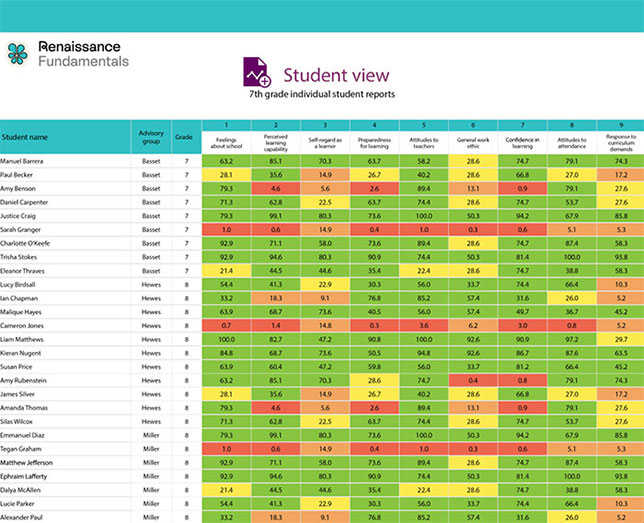Renaissance Intros Tool to Identify Student Challenges and Apply Interventions
- By Kate Lucariello
- 10/13/23
PreK–12 education technology company Renaissance has announced Renaissance Fundamentals, an assessment tool to help educators identify why students are struggling in school, apply interventions, and reassess to determine if the interventions are working.
Students complete 15-minute surveys, developed by school psychologists, multiple times during the school year. The surveys reveal how students feel about school, themselves as learners, and more.
The surveys incorporate the assessment formerly known as PASS (Pupils' Attitudes to School and Self).
With the goal of educators being able to support the whole child, the non-academic surveys ask students to react to 50 statements (grades 3-12) or 27 statements (grades K-2) on the following factors:
-
Feelings about school;
-
Perceived learning capabilities;
-
Self-regard as a learner;
-
Preparedness for learning;
-
Attitudes toward educators;
-
General work ethic;
-
Confidence in learning;
-
Attitudes to attendance; and
-
Response to curriculum demands.
Surveys are available in 27 languages. Reports are color-coded for easy identification and come with 130 or more possible interventions for each specific factor, the company said.

Each assessment survey then generates interactive reports at district, school, demographic, and individual student levels that educators and administrators can use to apply interventions to help improve "overall student achievement, increase student well-being, strengthen students' social and emotional skills, and improve students' relationships with others,” the company said.
Once interventions have been put in place, students retake the surveys to reveal whether the help has been successful.
The data can also be used to strengthen "multi-tier system of support (MTSS) frameworks and to evaluate the efficacy of social-emotional learning initiatives.”
"A student's success in school is tied to much more than just grades and time in the classroom — it is also connected to how they are feeling each morning, their relationships with others, and more," said Todd Brekhus, Renaissance chief product officer. "A complete, whole-child view is crucial if we are going to see every student for who they are and support them. Educators know their students best, and Renaissance Fundamentals will help educators proactively identify and address those challenges to ensure each one of their students thrives."
Educators can download a Sample Reports Book to learn about report scoring, color-coding, and actionable results, with examples of different reports included.
About the Author
Kate Lucariello is a former newspaper editor, EAST Lab high school teacher and college English teacher.